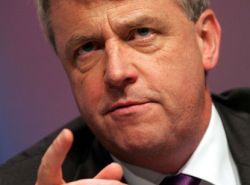 “In a shock U-turn yesterday, Sports Minister Mr Andrew Lansley removed all references to bare-fist fighting in the ‘free-fights-for-all’ Boxing Bill currently before Parliament. Earlier drafts of the Bill had allowed ‘any willing contestant’ to fight ‘with or without gloves’. Critics of the Bill, including the British Medical Association, had pointed out that the wording ‘or without gloves’ provided an opportunity for contestants to fight bare-fisted if they so wished, a practice known to increase serious injury and fatalities.
“In a shock U-turn yesterday, Sports Minister Mr Andrew Lansley removed all references to bare-fist fighting in the ‘free-fights-for-all’ Boxing Bill currently before Parliament. Earlier drafts of the Bill had allowed ‘any willing contestant’ to fight ‘with or without gloves’. Critics of the Bill, including the British Medical Association, had pointed out that the wording ‘or without gloves’ provided an opportunity for contestants to fight bare-fisted if they so wished, a practice known to increase serious injury and fatalities.
My Lansley has insisted he never envisaged bare-fist fighting. Speaking in the House of Commons yesterday, he said: ‘I understand that references to ‘or without gloves’ in the Bill can be taken to mean that we want to allow bare-fist fighting. This was never the intention. I have therefore removed all references to ‘without gloves’ from the Bill.’
The announcement comes only days after Gordon Bennett, head of national fight regulator Monitor said: ‘an amount of bare-fist fighting will be appropriate’.
Critics of the Bill welcomed the amendments, saying they were a step in the right direction, but pointed out that the changes only affected about half of all fights.”
Politicians have a bit of a thing about U-turns. While the rest of us will quite cheerfully U-turn when we find ourselves up the wrong street, any politician worth his or her salt always insists he or she doesn’t ‘do’ U-turns. Or when they do – as Mr Lansley appears to have done – they simply deny the U-turn, by saying they were never pointing in the wrong direction in the first place.
Just as any political hack is always on the look out for politicians caught U-turning, reversing up one-way streets, backing out of alleyways, even going the wrong way around roundabouts, indeed any manoeuvre that might suggest a want of steadfastness of purpose or lack of direction on the part of politicians.
And so it was that the other Mr Lansley, the Secretary of State for Health, charged with a U-turn, insisted that he had never envisaged introducing price competition into the NHS, and the media erupted with cries of U-turns. Dr Hamish Meldrum, Chief Pongo at the BMA, while distancing himself from tacky journalese, said much the same thing, welcoming the fact that ‘health secretary Andrew Lansley had listened to and acted on the views of doctors’.
Dr No is unimpressed by this so-called U-turn. He suspects it may turn out in time to be an S-turn, or a Z-turn. In the light of history, it may even stand revealed as an I-turn – a turn without a turn; in fact, no turn at all.
For let us not forget that what we now have is effectively a Tory government. The Lib-Dems are now so clogged up that one more pull on the political loo chain will see them overflow, and run down the drains of history, leaving a Tory government implementing Tory policy. And in health, that means, as it has since the late 1980s when Mrs Hacksaw and BATman first introduced them, markets and competition.
However loudly Mr Lansley may protest today that the market and competition will be on quality not price, it seems he may protest too loud, for it remains an inescapable fact that all the antecedents and coincidents point to competition not just on quality, but also on price.
We have the weight of Tory history and ideology, seen not just in health, but in the utilities and railways; and the embarrassment that a market where the prices are fixed is not a market. We have the threat of the imposition of competition law, both our own and European, that will argue that price fixing is anti-competitive. We have the earlier drafts of the Bill, with clear provision for competition on price, and the current Bill, which still leaves much provision of healthcare unfettered by the price-fixing national tariff.
And lastly, but by no means least, we have – quite remarkably – Mr Lansley brazenly closing one door while opening another:
‘You are entirely right in observing that, whilst the government’s intention not to introduce a general policy of price competition is clear, it is a possibility that Monitor could in future seek to pursue a different approach, subject to agreement with the NHS Commissioning Board.’
Further and better particulars on what such a ‘different approach’ might be have been helpfully spelt out by David Bennett, the newly appointed boss of Monitor, the NHS economic regulator:
“‘I understand why people are nervous about price competition,’ he said. ‘But over time there will be areas where it is useful.’
Mr Bennett, who has ‘experience in sectors that have gone from monolithic public providers to market-type arrangements’, including gas and electricity provision, said price competition was likely to be introduced slowly in the NHS.
‘It is more likely to be at commodity level rather than specialist services,’ he said. ‘Monitor and the NHS Commissioning Board will be very careful about where we introduce it.’”
From where Dr No sits, it appears all the media – and BMA – hullabaloo about U-turns on price competition is a little premature. The ‘different approach’ may be softly-softly – but make no mistake – competition on price is still very much alive.
Mr Lansley may have achieved widespread headlines declaring he has U-turned on price competition. But in his head, Dr No suspects, the mantra remains the same: ‘U-turn if you want to. The Lansley’s not for turning’.
